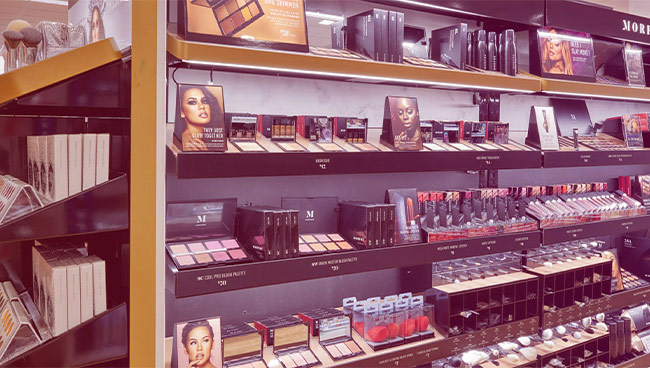By Anne D’Innocenzio // AP News, June 12 2019
Black and other darker-skinned women had long struggled to find makeup that matched or complemented their skin.
But a widening array of products is showing up at mainstream retailers with an eye toward the multicultural consumer.
A big game changer was Rihanna’s Fenty Beauty collection, which was launched two years ago and is sold at Sephora and Fentybeauty.com. Among the highlights: 50 shades of foundation from the palest white to deep brown.
Elsewhere, shoppers can now find more variety. Target, which started offering an assortment of textured hair care brands two decades ago, has in recent years expanded its space dedicated to the category to 36 feet from 8 feet in select stores. Last year it introduced new cosmetic brands which cater to women with medium to deep skin tones. Target now carries more than 150 brands and more than 400 products that cater to the multicultural customer. Earlier this year, the discounter expanded its multicultural sun care offerings with the introduction of Black Girl Sunscreen and Unsung.
Meanwhile, since January CVS Health has added 600 new shades of foundation and concealers. And this year, Walmart began carrying all shades of its top foundation brands across its chain: Maybelline Fit Me, Revlon Color Stay, Covergirl True Blend and L’Oreal True Match. The shade range expanded by more than 20% over the last year.
Multicultural customers tend to be engaged and more experimental, according to studies. Hispanic women who perform a beauty routine are more likely to experiment and adopt multiple steps into their routines, with two-thirds saying they create complex makeup looks, compared to 51% of U.S. women overall, according to a recent survey by Mintel. Black women are more likely to be interested in trends surrounding natural beauty products than women overall, Mintel says.
Still, “it’s a big challenge to navigate,” said Coye Nokes, a partner in OC&C Strategy Consultants’ consumer and retail practice. “Not every skin care is right.”
“…decide, which areas you want to splurge on. Maybelline, typically found at drugstores and other low-priced chains, recently launched a red lipstick which is marketed as universal and tested it on 50 diverse skin tones,” says Wendy Liebmann, CEO of WSL Strategic Retail.
Here are some tips to navigate the options:
- Do the research: Do you want to go only with black entrepreneur-owned brands? For example, earlier this year Ulta launched Uoma Beauty, founded by Nigerian-born Sharon Chuter, who is a former executive at the luxury goods conglomerate LVHM. The exclusive collection has more than 51 foundations. Also, decide which areas you want to splurge on, says Wendy Liebmann, CEO of WSL Strategic Retail. She cited Maybelline, typically found at drugstores and other low-priced chains, which recently launched a red lipstick that it has marketed as universal and tested it on 50 diverse skin tones. Also, request samples whether from a store or from a cosmetic company.
- Play with the tools: Sephora uses Color IQ, which scans the surface of your skin, captures the exact skin tone, and then assigns it a Color IQ number. That number is used to produce precise color matches for lip products, foundations, and concealers. At Ulta, shoppers can try on makeup using its GlamLab app that lets shoppers browse, filter and play around with products. Target customers can virtually try on hundreds of makeup items, including various lip and cheek colors via a feature called Target Beauty Studio on Target’s website. CVS is launching next month a new “shade finder” tool — similar to paint swatches — in 6,000 of its stores to help customers find the right shade of foundation and concealer across 12 different brands.
- Take advantage of store events and services: Target offers events at its stores where customers can meet with founders of multicultural brands. Last year, it held more than 30 events and it plans to hold more than 60 this year. Sephora also offers free beauty classes that address different skin care needs and beauty and makeup interests for all clients. And classes are customized for attendees. Macy’s, which has been expanding color ranges under long-time partners like Estee Lauder and more ethnic-focused brands like Black Up, says its beauty advisers are trained to understand skin care by concern.
In more than 170 stores in select markets, CVS launched CVS Pharmacy y mas, a shopping experience that provides more personalized service to the Hispanic community and includes bilingual staff. It personalizes the product selection including beauty products based on local demand.


